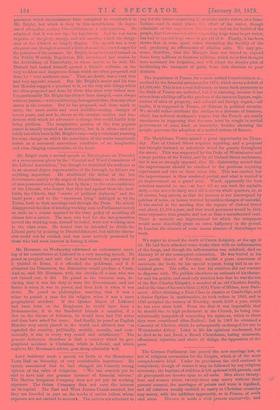Lord Salisbury made a speech on India in the Manchester
Town Hall on Saturday, of very considerable importance. He openly announced that he had changed his formerly strong opinion of the value of irrigation. " We can scarcely yet be said to have had one genuine instance of financial success." The Madras Irrigation Company does not yet pay its working expenses. The Orissa Company does not earn the interest on its capital. The East and West Jumna Canals succeed, but they are founded in part on the works of native rulers, whose expenses are not carried to account. The natives are reluctant to pay for the water—expecting it, as under native rulers, as a bene- faction—and in many places the effect of the water, though admirable on the vegetation. has been so bad on the health of the people, that Government, af ter expending huge sums to get water, has had to expend huge sums to get rid of it. Finally, it has been shown that in some spots water diminishes the fertility of the soil, producing an effioresence of alkaline salts. We may pre- sume, therefore, that the Marquis does not intend to expend those forty millions or fourteen millions, which he at first thought were necessary for irrigation, and will adopt the simpler plan of facilitating the transport of grain from rich districts to poor districts.


































 Previous page
Previous page